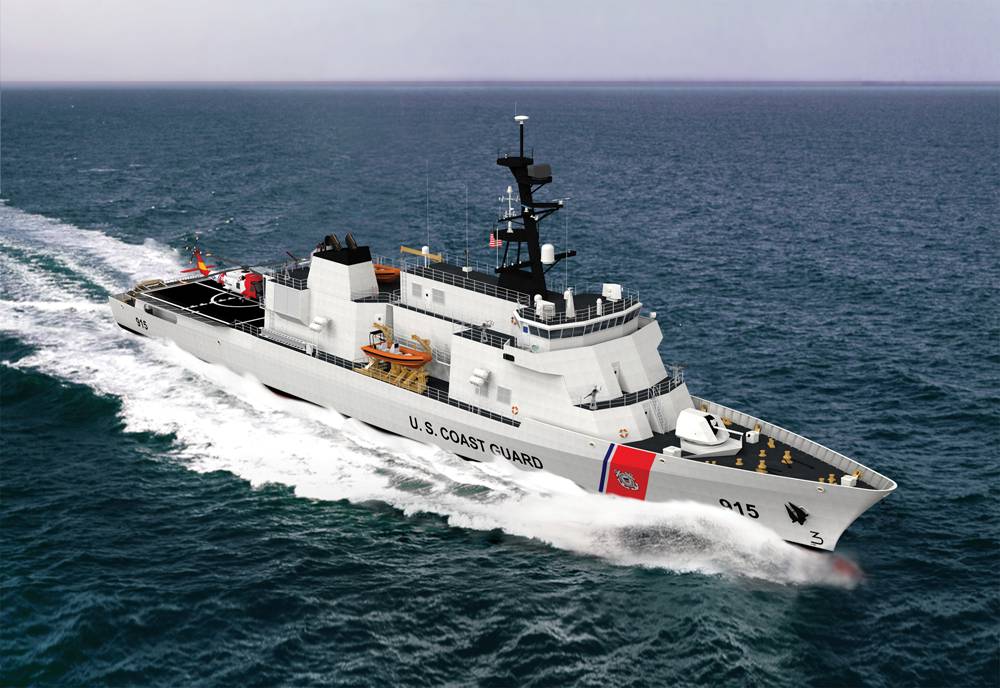
This post was updated to accurately reflect the size of the Offshore Patrol Cutter contract the Coast Guard is re-competing. An earlier version of this post included an incorrect number of hulls included in the re-compete.
The Coast Guard is recompeting its potentially $10.5 billion Offshore Patrol Cutter contract because the program risks falling fatally behind schedule due to hurricane damage to the shipyard initially awarded the contract.
The program has already slipped nearly a year behind schedule and could cost an additional $659 million to finish just the first four OPCs contracted to Eastern Shipbuilding Group as part of a nine-hull deal awarded in 2016, according to a recent Congressional Research Service report. To reign-in costs and try getting the program back on schedule, the Coast Guard is now taking the extraordinary measure of recompeting the entire contract for OPC hulls five through 25.
The 25-hull OPC fleet is intended to replace the Coast Guard’s current fleet of 29 medium-endurance cutters, some of which were built during the Vietnam War. The Coast Guard previously set a target cost of $310 million per cutter. The service is asking potential bidders to provide analysis comparing their anticipated costs with this target for building the six OPCs
Friday is the deadline for contractors to provide comments on an OPC industry studies statement of work. The study, along with an industry day scheduled for next Wednesday, is intended to give the Coast Guard an assessment of the technical effort, cost risks and schedule risks associated with recompeting the OPC contract.
“These activities will provide fresh insight into the current state of the shipbuilding industrial base and inform the Coast Guard’s way forward on a re-compete strategy to complete the OPC program of record,” Brian Olexy, the communication manager for the Coast Guard Acquisition Directorate, told USNI News in an email.
The Coast Guard intends to purchase up to 25 OPCs making this the service’s largest acquisition program. However, the current prime contractor, Panama City, Fla.-based Eastern Shipbuilding Group, is having a hard time fulfilling the contract due to damage caused in 2018 by Hurricane Michael.
Eastern Shipbuilding officials could not be reached for comment at the time of this post.
In September 2016, the Coast Guard awarded Eastern Shipbuilding Group a contract to build the future USCGC Argus (WMSM-915) with options to build up to nine OPCs. Eastern beat General Dynamics Bath Iron Works and Bollinger Shipyards to land the design and construction contract.
The average purchase cost for OPCs is about $421 million per ship, according to the CRS report. The first OPC, Argus, was funded in Fiscal Year 2018. The second OPC, the future USCGC Chase (WMSM-916) and long-lead-time materials for the third OPC were funded in the FY 2019.
Eastern Shipbuilding was just about to start building Argus and was gathering materials to start building Chase when Hurricane Michael hit the Florida panhandle, USNI News reported in October 2018.
Workers evacuated from the area and were slow to return. When they did, many took jobs rebuilding nearby Tyndall Air Force Base, which also suffered substantial damage from the hurricane, according to a statement released by Sen. Marco Rubio (R.-Fla.). Rubio supported a plan to modify Eastern Shipbuilding’s contract with the Coast Guard.
In October, the Coast Guard asked Congress for extraordinary relief from the contract, on behalf of Eastern Shipbuilding. The Coast Guard plan would allow Eastern Shipbuilding to continue building the first four OPCs but would move forward with seeking new bidders to build out the fleet, Adm. Karl Schultz, the commandant of the Coast Guard, said during an event co-hosted by the Center for Strategic and International Studies and the U.S. Naval Institute.
Lawmakers, though, did not sound too receptive to the plan. Congressional leaders detailed their concerns in a bipartisan letter to the Coast Guard sent Nov. 25, from Rep. Peter DeFazio (D-Ore.); the chair of the House Committee on Transportation and Infrastructure; ranking member Rep. Sam Graves (R-Mo.), Rep. Sean Patrick Maloney (D-N.Y.), chair of subcommittee on Coast Guard and Maritime Transportation; and ranking member Rep. Bob Gibbs, (R-Ohio).
“We are skeptical that such truly extraordinary relief is justified given that this ‘crisis’ was foreseeable and mostly avoidable. Further, we are concerned that this relief sets a damaging precedent that any current or future contract with the United States Coast Guard (Coast Guard or Service) could be renegotiated outside the Federal Acquisition Regulations,” their letter states.
The lawmakers are concerned the Coast Guard and Department of Homeland Security focused on “exploring options to resuscitate [Eastern Shipbuilding Group] and prevent it from defaulting on the OPC contract without first completing a transparent and objective alternative analysis.”
The chief lobbyist for Eastern Shipbuilding is former commandant of the Coast Guard, retired Adm. Robert Papp, who joined the company shortly after being awarded the initial OPC contract. Papp is the first Washington lobbyist hired by Eastern Shipbuilding, according to a company statement.
“The veil of secrecy regarding its analysis and the absence of any meaningful consultation by the Coast Guard and DHS with the Committee, provides us scant confidence that any revised OPC contract will not encounter a similar fate as the original contract,” the congressional letter states.





